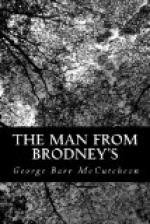“Do you expect me to handle this case for you, sir?”
“Sure.”
“Then let me handle it. Don’t interfere. When you start in to get somebody else’s money you have to do a good many things you don’t like, no matter whether you are a lawyer or a client.”
“But I don’t like the suggestion that my wife will be obliged to die in order——”
“Please leave all the details to me, Mr. Browne. It may not be necessary for her to die. There are other alternatives in law. Give the lawyers a chance. We’ll see what we can do. Besides, it would be unreasonable to expect his lordship to die also. All you have to do is to plant yourself on that island and stay there until we tell you to get off.”
“Or the islanders push me off,” lugubriously.
“Now, listen intently and I’ll tell you just what you are to do.”
Young Mr. Browne went away at dusk, half reeling under the responsibility of existence, and eventually reached the side of the anxious young woman uptown. He bared the facts and awaited the wail of dismay.
“I think it will be perfectly jolly,” she cried, instead, and kissed him rapturously.
Over on the opposite side of the Atlantic the excitement in certain circles was even more intense than that produced in Boston. Lord Deppingham needed the money, but he was a whole day in grasping the fact that his wife could not have it and him at the same time. The beautiful and fashionable Lady Deppingham, once little Agnes Ruthven, came as near to having hysteria as Englishwomen ever do, but she called in a lawyer instead of a doctor. For three days she neglected her social duties (and they were many), ignored her gallant admirers (and they were many), and hurried back and forth between home and chambers so vigorously that his lordship was seldom closer than a day behind in anything she did.
There was a great rattling of trunks, a jangling of keys, a thousand good-byes, a cast-off season, and the Deppinghams were racing away for the island of Japat somewhere in the far South Seas.
CHAPTER III
INTRODUCING HOLLINGSWORTH CHASE
While all this was being threshed out by the persons most vitally interested in the affairs of Taswell Skaggs and John Wyckholme, events of a most unusual character were happening to one who not only had no interest in the aforesaid heritage, but no knowledge whatever of its existence. The excitement attending the Skaggs-Wyckholme revelations had not yet spread to the Grand Duchy of Rapp-Thorberg, apparently lost as it was in the cluster of small units which went to make up a certain empire: one of the world powers. The Grand Duke Michael disdained the world at large; he had but little in common with anything that moved beyond the confines of his narrow domain. His court was sleepy, lackadaisical, unemotional, impregnable to the taunts of progression; his people




